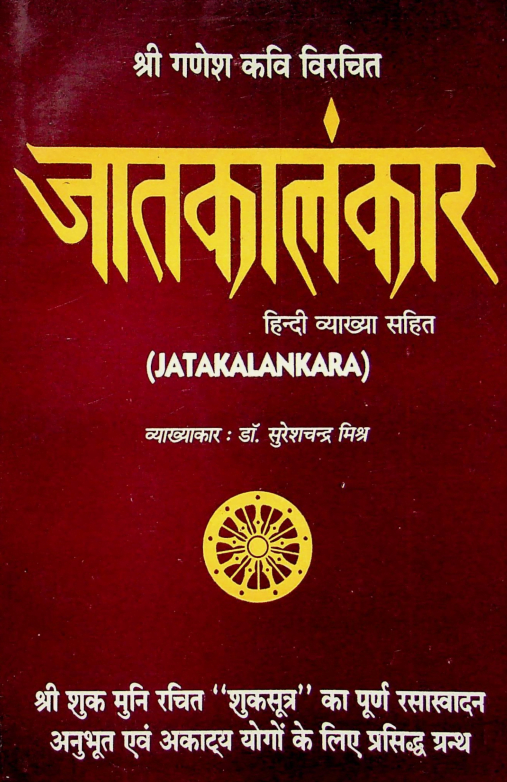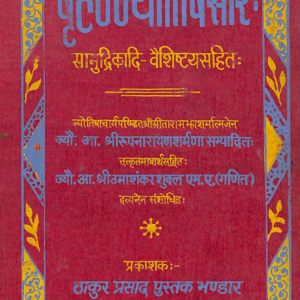Author: Ganesh Kavi
About the Translator:
Ganesh Kavi, also known as Ganesa Daivajna or Ganesh Daivajna, is a notable figure in the field of Vedic astrology (Jyotisha) and is traditionally credited with authoring the “Jatakalankar.” His works are highly regarded in the astrological community for their depth, clarity, and practical application. Ganesh Kavi’s contributions have had a lasting impact on the practice and understanding of astrology in India.
Life and Background
Historical Context:
- There is limited information available about the specific details of Ganesh Kavi’s life, including his exact dates of birth and death. However, it is generally believed that he lived during the medieval period in India, a time when astrology and other scholarly pursuits were highly esteemed.
Title and Recognition:
- The honorific “Kavi” suggests that Ganesh was not only an astrologer but also a poet and scholar. This indicates his proficiency in Sanskrit literature and his ability to convey complex astrological concepts in a poetic and accessible manner.
Major Contributions
Jatakalankar:
- Content and Significance: The “Jatakalankar” is Ganesh Kavi’s most famous work. It serves as a comprehensive guide to Vedic astrology, providing detailed instructions on the interpretation of natal charts and the prediction of various life events.
- Structure: The text is organized systematically, covering fundamental astrological principles, planetary influences, house significations, yogas (planetary combinations), dashas (planetary periods), and transits.
- Practical Application: “Jatakalankar” is known for its practical approach, making it a valuable resource for both novice and experienced astrologers. It emphasizes the importance of accurate calculations and thoughtful interpretations.
Other Works:
- Although “Jatakalankar” is his most well-known work, Ganesh Kavi is believed to have authored other texts and commentaries on astrology.
Key Themes and Teachings
Interconnection of Celestial and Terrestrial:
- Ganesh Kavi’s writings highlight the interconnectedness of celestial events and human experiences. He elaborates on how planetary positions at the time of birth influence an individual’s personality, fate, and life path.
Astrological Techniques:
- Graha Dasha (Planetary Periods): He provides insights into the system of planetary periods and their impact on different phases of life.
- Yoga (Planetary Combinations): Ganesh Kavi discusses auspicious and inauspicious planetary combinations, explaining their significance and effects.
- Bhava Phala (House Results): The text details the significance of each house in a horoscope and the results of planetary placements in these houses.
- Gochar (Transits): He elaborates on the effects of planetary transits on an individual’s life and how to interpret these movements accurately.
Karma and Free Will:
- Ganesh Kavi integrates the concept of karma into his astrological teachings, suggesting that while planetary influences are significant, individuals also have the capacity for free will and self-determination. This balance between fate and free will is a recurring theme in his work.
Influence and Legacy
Astrological Tradition:
- Ganesh Kavi’s “Jatakalankar” has become a cornerstone text in the study of Vedic astrology. Its systematic approach and comprehensive coverage have made it an essential resource for astrologers seeking to deepen their knowledge and refine their practice.
Educational Impact:
- The text is widely used in the education and training of astrologers. Its clear explanations and practical guidelines help students and practitioners develop a thorough understanding of astrological principles and techniques.
Cultural Significance:
- Vedic astrology remains an integral part of Hindu culture, influencing various aspects of life such as marriage, career, health, and spirituality. Ganesh Kavi’s contributions have helped preserve and propagate this ancient knowledge, ensuring its continued relevance in contemporary society.
Conclusion
Ganesh Kavi, through his seminal work “Jatakalankar,” has made significant contributions to the field of Vedic astrology. His detailed and systematic approach to astrological interpretation has provided valuable insights and practical tools for generations of astrologers. The enduring legacy of his teachings reflects his profound understanding of Jyotisha and his dedication to advancing the field. Ganesh Kavi’s work continues to inspire and guide practitioners, preserving the rich tradition of Vedic astrology for future generations.






